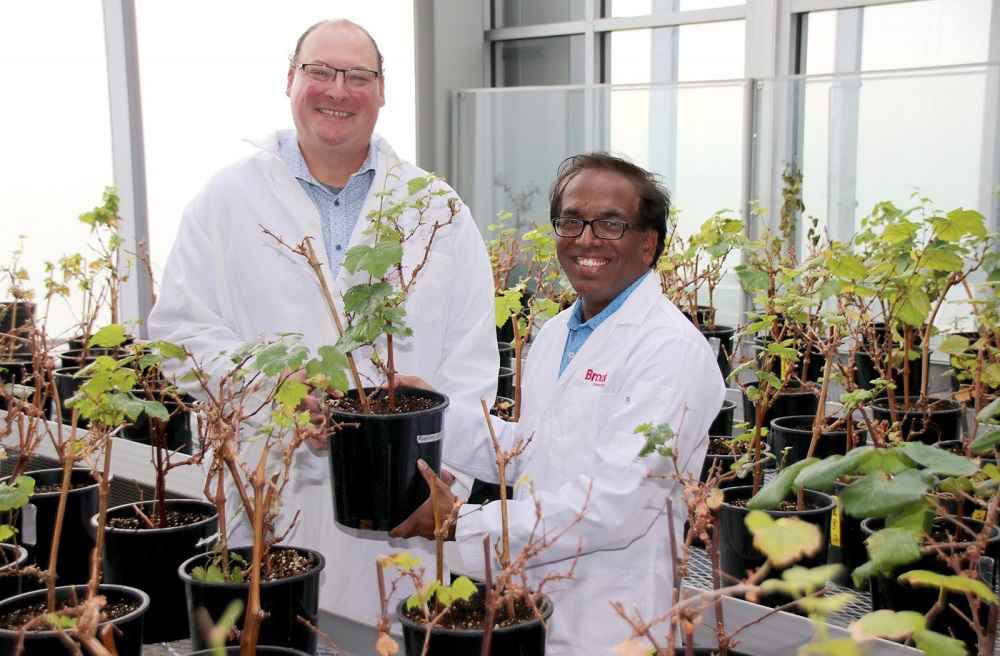
Brock University’s research that advances Canada’s grape and wine industry is expanding from lab to field to other areas of agriculture thanks to a CA$3.5-million grant from the Canada Foundation for Innovation (CFI).
The funding supports the Clean Agriculture for Sustainable Production (CASP) Field Infrastructure project, which will include the establishment of a Brock-led research farm where scientists from Brock, other institutions and industry will develop agricultural innovations.
“This investment not only transforms research that supports Canada’s $11.6-billion grape and wine industry but allows industry to have access, through research partnerships, to state-of-the-art facilities to identify and produce elite performing plant material,” says Professor Debbie Inglis, director of Brock’s Cool Climate Oenology and Viticulture Institute (CCOVI) and core CCOVI scientist. “Establishing all the tools necessary to implement a domestic clean plant program while trialing disease-resistant and climate-resilient varieties will allow industry to become more self-reliant and environmentally friendly.”

Co-leading the multi-institutional project are CCOVI Principal Scientist Sudarsana Poojari and CCOVI researcher and Assistant Professor of Biological Sciences Jim Willwerth.
The first phase of the project, the Clean Plant Program, builds on initiatives — including the national grapevine germplasm repository, the Canadian Food Inspection Agency partnership CLEANSED (CLEan plAnt extractioN SEquencing Diagnostics), and the Canadian Grapevine Certification Network (CGCN) partnership — where CCOVI and a wide variety of partners work together to produce certified virus-free grapevines for the grape and wine industry.
Poojari’s lab uses methods such as microshoot tip tissue culture therapy and high throughput sequencing (HTS) to produce healthy vines. Microshoot tip tissue culture is a virus elimination technique where a tiny part of an apical shoot tip of a vine is cut off and grown under controlled conditions. HTS is a genomics-based test with the ability to detect all known and unknown viruses in grapevines with high accuracy and reliability.
“CASP funding enables us to expand our capacity to produce pathogen-free grapevines,” says Poojari. “Through this infrastructure, our goal is to play a pivotal role in safeguarding the health and productivity of vineyards across Canada, making significant contributions to the sustainability of the grape and wine sector in Canada.”
The second phase of the project, Precision Agriculture and Ecological Interactions, examines how these clean grapevines interact with other plants and organisms. Understanding plant interactions in field and greenhouse ecosystems will enable selection of more resilient crops, says Willwerth.
The team will also research and develop the application of precision agriculture. This includes assessing and monitoring tools that can provide an early warning system for growers to detect factors that would impact yields and production, says Willwerth.
“This funding enables us to develop field and greenhouse technologies and systems that improve sustainability, reduce production costs and carbon footprints and develop plants that better tolerate abiotic stress and biotic pests,” he says. “More efficient production practices, and plants that are more resilient to field and urban settings, will economically and environmentally benefit Canada’s producers.”
In the third phase of the project, Urban Applications, the research farm will become a test bed for integrating innovative approaches into an urban setting.
In addition to Poojari, Willwerth and Inglis, a variety of Brock researchers will be involved in the project’s various stages, including Professor of Biological Sciences Liette Vasseur, Assistant Professor of Biological Sciences Kiyoko Gotanda, Assistant Professor of Engineering Shengrong Bu, Assistant Professor of Engineering and Biological Sciences Alonzo Zavafer and Professor of Biological Sciences Ping Liang.
The team also includes national collaborators Simone Castellarin from the University of British Columbia and Caroline Provost from Centre de recherche agroalimentaire de Mirabel in Quebec.